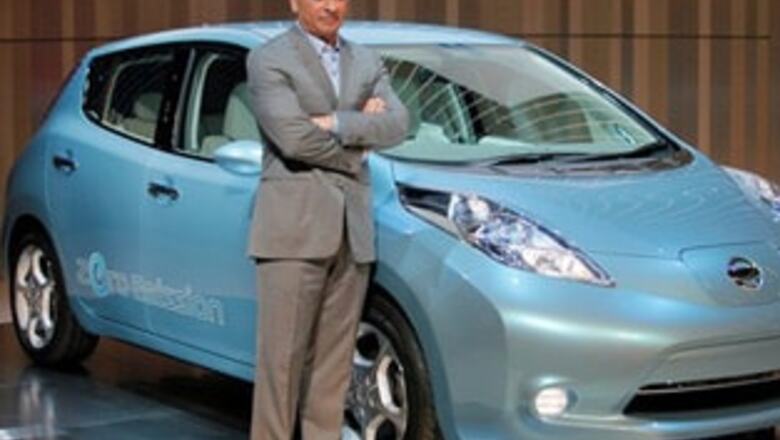
views
Yokohama: Nissan Motor Co took the wraps off its much-awaited electric car on Sunday, naming the hatchback "Leaf" and taking a step towards its goal of leading the industry in the zero-emissions field.
Japan's No. 3 automaker and its French partner, Renault SA, have been the most aggressive proponents of pure electric vehicles in the auto industry, announcing plans to mass-market the clean but expensive cars globally in 2012.
Nissan will begin selling the first Leaf cars in the United States, Japan and Europe towards the end of 2010, adding two more models soon after. It expects production to start with around 200,000 units a year at the global roll-out in 2012.
Twinning the car's unveiling with the inauguration of Nissan's new global headquarters in Yokohama, south of Tokyo, Chief Executive Carlos Ghosn drove up to a stage in a sky-blue Leaf prototype, carrying former Japanese Prime Minister Junichiro Koizumi and two other guests to greet a throng of journalists who made the trip from all over the world.
"We celebrate today the start of a new chapter of our company's life," Ghosn said.
Nissan is returning to the port city of Yokohama, where it was founded in 1933, after being based in Tokyo's posh Ginza district for the last 41 years.
Hit by sliding vehicle sales worldwide since the financial crisis hit last year, Nissan has suspended its goals set under a mid-term business plan, with the exception of its aggressive push into the electric car business.
With oil prices topping $60 even in a recession and environmental regulations tightening all the time, Ghosn said he was optimistic about electric vehicles entering the mainstream, expecting them to represent one in 10 new cars globally by 2020.
"We are seeing electric cars not as a niche car but as a mass-market car," he told reporters after the inauguration.
"The big problem is going to be (production) capacity."
Ghosn described the Leaf as a "powerful car, like having a turbo" charger except with no delay in response since there is no gear shift. He stressed that despite the growing popularity of gasoline-electric hybrid vehicles in some markets, they remained a niche with less than 2 percent of the global market.
Other automakers such as Toyota Motor Corp and Volkswagen AG have also announced plans to launch electric cars in the next several years, but they say it could take decades for the vehicles to spread due to their high cost, limited driving range and long charging times with the current battery technology.
Nissan did not announce pricing for the five-seater Leaf, but Ghosn said the price, without the expensive lithium-ion battery that Nissan is considering leasing, would be within the range of a comparable gasoline-engine car.
Nissan's Leaf has a top speed of over 140 km/hour and a cruising range of at least 160 km --a distance that covers the needs of 80 percent of the world's drivers, according to Nissan.
The carmaker has lagged its bigger domestic rivals Toyota and Honda Motor Co in offering fuel-sipping hybrid cars, which have taken the Japanese market by storm this year with the help of government stimulus steps.
For years, Ghosn has downplayed the importance of hybrid cars -- both for consumers hoping to save money at the pump and for manufacturers looking to make profit. As recently as a month ago, he sought to knock down the hybrid hype, saying electric cars were a far better alternative despite their limited cruising range.
But in what could signal a major shift in strategy, Ghosn said Nissan would leave the option open to offering hybrid vehicles if the market demands it. So far, Nissan has only announced plans to launch an internally developed hybrid vehicle on high-end models.
"It's going to take some time before we have a complete, full (electric vehicle) product line-up from entry level to the top," he said.
"In the meantime, you just cannot abandon the market--you're going to have to continue to develop your product line-up with combustion engine, clean diesel, hybrids, etc."




















Comments
0 comment